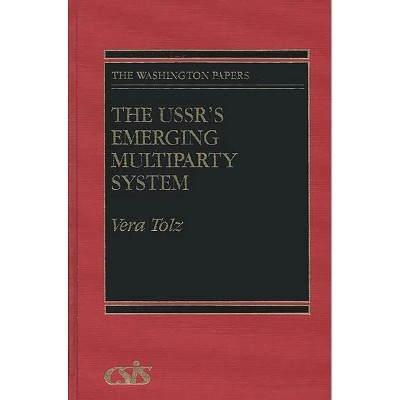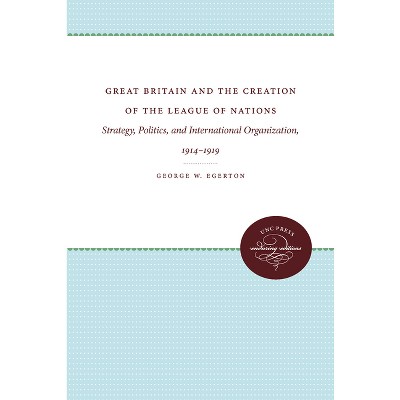Sponsored

Changing the Guard in Brussels - (Washington Papers) by Guy de Bassompierre
In Stock
Sponsored
About this item
Highlights
- In a short volume De Bassompierre successfully links the emerging political patterns to the overall economic integration endeavor.
- About the Author: GUY DE BASSOMPIERRE is minister counselor (economic and commercial at the Belgian Embassy in Washington, D.C.
- 182 Pages
- Freedom + Security / Law Enforcement, International
- Series Name: Washington Papers
Description
About the Book
In a short volume De Bassompierre successfully links the emerging political patterns to the overall economic integration endeavor. He concludes that this `condominium of 12 sovereign nations offers an unparalleled adventure for the national bureaucracies in managing what is, in effect, a global superpower in the making.' Of broader appeal than its title suggests. Valuable for upper-division students in all colleges and universities. Choice
Watching the tortuously slow process of European integration in recent years has been akin to watching grass grow. Twelve European powers, most of whom have had a taste of global dominion in the past, are understandably reluctant to forsake their traditional sovereignty. But a process is under way that is beginning to acquire a new momentum, especially with the 1992 deadline so close. Changing the Guard in Brussels is an appraisal of the institutions of the European Community as seen by someone familiar with the daily activity of the Council of Ministers. It deals with reality and results from personal experience, not from an academic study.
By 1992, all European Economic Community internal barriers are slated to come down, ensuring the free flow of persons, goods, and capital. European union, if ever achieved, will have profound political, economic, and security consequences for the world at large. U.S. policymakers should notice what is happening and what it could portend. Regardless of the outcome, the process is a unique and absorbing experiment in supranationality. Nothing quite like it has ever before been attempted. This book therefore is a story about 320 million free and prosperous people reaching for the next stage of European evolution. Despite its moments of comic relief, such a serious and historic adventure is likely to have worldwide impact.
Book Synopsis
In a short volume De Bassompierre successfully links the emerging political patterns to the overall economic integration endeavor. He concludes that this `condominium of 12 sovereign nations offers an unparalleled adventure for the national bureaucracies in managing what is, in effect, a global superpower in the making.' Of broader appeal than its title suggests. Valuable for upper-division students in all colleges and universities. Choice
Watching the tortuously slow process of European integration in recent years has been akin to watching grass grow. Twelve European powers, most of whom have had a taste of global dominion in the past, are understandably reluctant to forsake their traditional sovereignty. But a process is under way that is beginning to acquire a new momentum, especially with the 1992 deadline so close. Changing the Guard in Brussels is an appraisal of the institutions of the European Community as seen by someone familiar with the daily activity of the Council of Ministers. It deals with reality and results from personal experience, not from an academic study. By 1992, all European Economic Community internal barriers are slated to come down, ensuring the free flow of persons, goods, and capital. European union, if ever achieved, will have profound political, economic, and security consequences for the world at large. U.S. policymakers should notice what is happening and what it could portend. Regardless of the outcome, the process is a unique and absorbing experiment in supranationality. Nothing quite like it has ever before been attempted. This book therefore is a story about 320 million free and prosperous people reaching for the next stage of European evolution. Despite its moments of comic relief, such a serious and historic adventure is likely to have worldwide impact.Review Quotes
?As the European Economic Community moves toward a full economic union in 1992, De Bassompierre suggests that the world views it as an economic giant but a political dwarf.' Drawing on his scholarly training and on his experience as a diplomat in the EEC, the author probes the records of the political institutions of the European Community to find ways to increase its political stature. He chooses to focus on the presidency of the Council of Ministers, an office that rotates every six months among the 12 member nations. He also analyzes other councils and institutions that are part of the complex evolving political structures of a United Europe.' In a short volume De Bassompierre successfully links the emerging political patterns to the overall economic integration endeavor. He concludes that this condominium of 12 sovereign nations offers an unparalleled adventure for the national bureaucracies in managing what is, in effect, a global superpower in the making.' Of broader appeal than its title suggests. Valuable for upper-division students in all colleges and universities.?-Choice
"As the European Economic Community moves toward a full economic union in 1992, De Bassompierre suggests that the world views it as an economic giant but a political dwarf.' Drawing on his scholarly training and on his experience as a diplomat in the EEC, the author probes the records of the political institutions of the European Community to find ways to increase its political stature. He chooses to focus on the presidency of the Council of Ministers, an office that rotates every six months among the 12 member nations. He also analyzes other councils and institutions that are part of the complex evolving political structures of a United Europe.' In a short volume De Bassompierre successfully links the emerging political patterns to the overall economic integration endeavor. He concludes that this condominium of 12 sovereign nations offers an unparalleled adventure for the national bureaucracies in managing what is, in effect, a global superpower in the making.' Of broader appeal than its title suggests. Valuable for upper-division students in all colleges and universities."-Choice
About the Author
GUY DE BASSOMPIERRE is minister counselor (economic and commercial at the Belgian Embassy in Washington, D.C. Most recently he was a visiting scholar at the Center for Strategic and International Studies (1987-1988). Previously he served as adviser on European affairs to the Belgian minister of external relations.Shipping details
Return details
Frequently bought together


Trending Non-Fiction















